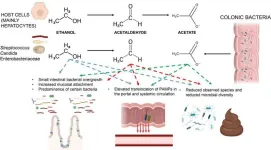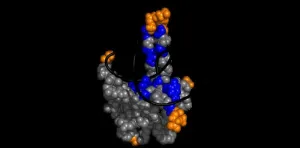(Press-News.org) One of the hallmarks of Alzheimer’s disease is disruption to the body’s circadian rhythm, the internal biological clock that regulates many of our physiological processes. Nearly 80% of people with Alzheimer’s experience these issues, including difficulty sleeping and worsening cognitive function at night. However, there are no existing treatments for Alzheimer’s that target this aspect of the disease.
A new study from researchers at University of California San Diego School of Medicine has shown in mice that it is possible to correct the circadian disruptions seen in Alzheimer’s disease with time-restricted feeding, a type of intermittent fasting focused on limiting the daily eating window without limiting the amount of food consumed.
In the study, published August 21, 2023 in Cell Metabolism, mice that were fed on a time-restricted schedule showed improvements in memory and reduced accumulation of amyloid proteins in the brain. The authors say the findings will likely result in a human clinical trial.
“For many years, we assumed that the circadian disruptions seen in people with Alzheimer’s are a result of neurodegeneration, but we’re now learning it may be the other way around — circadian disruption may be one of the main drivers of Alzheimer’s pathology,” said senior study author Paula Desplats, PhD, professor in the Department of Neurosciences at UC San Diego School of Medicine. “This makes circadian disruptions a promising target for new Alzheimer’s treatments, and our findings provide the proof-of-concept for an easy and accessible way to correct these disruptions.”
Alzheimer’s disease affects more than 6 million Americans, and it is considered by many to be the biggest forthcoming health challenge in the United States. People with Alzheimer’s experience a variety of disruptions to their circadian rhythms, including changes to their sleep/wake cycle, increased cognitive impairment and confusion in the evenings, and difficulty falling and staying asleep.
“Circadian disruptions in Alzheimer’s are the leading cause of nursing home placement,” said Desplats. “Anything we can do to help patients restore their circadian rhythm will make a huge difference in how we manage Alzheimer’s in the clinic and how caregivers help patients manage the disease at home.”
Boosting the circadian clock is an emerging approach to improving health outcomes, and one way to accomplish this is by controlling the daily cycle of feeding and fasting. The researchers tested this strategy in a mouse model of Alzheimer’s disease, feeding the mice on a time-restricted schedule where they were only allowed to eat within a six-hour window each day. For humans, this would translate to about 14 hours of fasting each day.
Compared to control mice who were provided food at all hours, mice fed on the time-restricted schedule had better memory, were less hyperactive at night, followed a more regular sleep schedule and experienced fewer disruptions during sleep. The test mice also performed better on cognitive assessments than control mice, demonstrating that the time-restricted feeding schedule was able to help mitigate the behavioral symptoms of Alzheimer’s disease.
The researchers also observed improvements in the mice on a molecular level. In mice fed on a restricted schedule, the researchers found that multiple genes associated with Alzheimer’s and neuroinflammation were expressed differently. They also found that the feeding schedule helped reduce the amount of amyloid protein that accumulated in the brain. Amyloid deposits are one of the most well-known features of Alzheimer’s disease.
Because the time-restricted feeding schedule was able to substantially change the course of Alzheimer’s in the mice, the researchers are optimistic that the findings could be easily translatable to the clinic, especially since the new treatment approach relies on a lifestyle change rather than a drug.
“Time-restricted feeding is a strategy that people can easily and immediately integrate into their lives,” said Desplats. “If we can reproduce our results in humans, this approach could be a simple way to dramatically improve the lives of people living with Alzheimer’s and those who care for them.”
Co-authors of the study include: Daniel S. Whittaker, Laila Akhmetova, Daniel Carlin, Haylie Romero and David K. Welsh, all at UC San Diego, and Christopher S. Colwell at UCLA.
This study was funded, in part, by the National Institute on Aging (grants AG061831 and 5T32AG066596-02) and the National Insititute of Neurological Disorders and Stroke (grant P30NS047101).
# # #
END
Intermittent fasting improves Alzheimer’s pathology
Mice on a time-restricted feeding schedule had better memory and less accumulation of amyloid proteins in the brain compared to controls
2023-08-21
ELSE PRESS RELEASES FROM THIS DATE:
New “bandit” algorithm uses light for better bets
2023-08-21
How does a gambler maximize winnings from a row of slot machines? This is the inspiration for the "multi-armed bandit problem," a common task in reinforcement learning in which "agents" make choices to earn rewards. Recently, an international research team led by Hiroaki Shinkawa at the University of Tokyo developed an extended photonic reinforcement learning scheme that moves from the static bandit problem towards a more challenging dynamic environment. This study was published July 25 in Intelligent Computing, a Science Partner Journal.
The success of ...
For men with erectile dysfunction, penile implants are usually covered by insurance – but not always
2023-08-21
August 21, 2022 – Implantable penile prostheses (IPPs) are an established treatment option for erectile dysfunction (ED), and are covered by insurance in about 80% of cases, reports a paper in the September issue of Urology Practice®, an Official Journal of the American Urological Association (AUA). The journal is published in the Lippincott portfolio by Wolters Kluwer.
However, some employer-sponsored insurance plans specifically exclude this guideline-recommended treatment option for ED, according to the new research by Dr. Mohit Khera, MD, MBA, MPH, of Baylor College ...
Adversities permanently change our brains
2023-08-21
Neuroscientists at Radboudumc show that adversities permanently change the functioning of the brain. Furthermore, an aberrant reaction of the brain to adversities is related to anxiety symptoms. This may have predictive value for the development of psychiatric disorders.
Your brain is shaped by the things you experience. That sounds logical, but can you really measure that? And what can you do with it? Neuroscientists at Radboud university medical center investigated the influence of adversities in life on patterns in the brain. They found remarkable associations that may have predictive value for the development of psychiatric disorders.
Special ...
MSU hires Judd Herzer for new mobility director role
2023-08-21
EAST LANSING, Mich. – Michigan State University today named Judd Herzer as the director of MSU Mobility to help amplify and focus the university’s vast research activities in the smart-vehicle landscape. Satish Udpa, University Distinguished Professor in the College of Engineering at MSU and co-founder of MSU Mobility, has been fulfilling the duties of this newly created role in an interim capacity while the university looked for the ideal candidate.
Mobility is among MSU’s principal areas of research and innovation, and MSU Mobility and its ...
Antil receives funding for workshop on digital twins
2023-08-21
Harbir Antil, Director, Center for Mathematics and Artificial Intelligence, and Professor, Mathematical Sciences, received funding for: "Mathematics for Digital Twins (MATH-DT)."
This award will provide support for a workshop titled "Mathematical Opportunities in Digital Twins" to be held on Dec. 11-13, 2023, at George Mason University's campus in Arlington, VA.
The workshop will bring together key experts working in many aspects of mathematics, key application fields, and industry with the goal of determining ...
Understanding mechanisms of alcohol-associated bowel disease
2023-08-21
Alcohol consumption is a significant risk factor for gastrointestinal diseases, including cancer. Alcohol can damage the gastrointestinal tract in several ways. It can promote an impairment of several intestinal barrier functions, leading to leaky gut and dysbiosis. Ethanol metabolism can also produce toxic substances such as acetaldehyde and acetate, further damaging the gut and potentially promoting cancer. Ethanol and its metabolites enhance DNA damage response and dysregulate the epithelial proliferation/differentiation program, thereby increasing the risk of cancer development.
In a new paper published in eGastroenterology, ...
SARS-CoV-2: The grasping fingers of the viral N protein
2023-08-21
#FRANKFURT. Immediately after the infection of a cell in the throat or lungs, the SARS-CoV-2 virus works very hard to replicate, using the human cell’s metabolic pathways to produce its proteins and make sure that its genetic material (the RNA genome) is copied. The RNA genome is then packaged very compactly into new virus particles that are released from the cell to infect more cells.
One viral protein, called the nucleocapsid protein (N), is particularly important for rapid and efficient replication. ...
Climate win-win: study quantifies benefits of enhanced weathering
2023-08-21
Applying ground-up silicate rock to Midwestern farm fields can capture significant amounts of carbon dioxide and prevent it from accumulating in the atmosphere, according to a new study that successfully quantified those climate benefits for the first time.
Working with Eion Corp., researchers at the University of Illinois Urbana-Champaign and the Leverhulme Centre for Climate Change Mitigation (LC3M) developed a new method to calculate the CO2-reduction potential of basalt rock amendments applied to cropland soil, a process known as enhanced weathering.
Traditional row-crop agriculture releases sizable amounts of soil-derived carbon to the atmosphere as CO2, a greenhouse gas ...
Late mortality after COVID-19 infection in veterans vs risk-matched comparators
2023-08-21
About The Study: The findings of this study indicate that COVID-19 was not associated with any clinically significant excess mortality among those who survived at least 180 days compared with closely risk-matched comparators, despite having worse 2-year total mortality. This finding has individual level and health system planning implications and should be reassuring to persons who have survived COVID-19 for at least 180 days.
Authors: Theodore J. Iwashyna, M.D., Ph.D., of the Ann Arbor VA in Ann Arbor, Michigan, is the corresponding author.
To access the embargoed study: Visit our For The Media ...
Screen time at age 1 and communication, problem-solving developmental delay at ages 2 and 4
2023-08-21
About The Study: In this study including 7,097 mother-child pairs, greater screen time for children at age 1 was associated with developmental delays in communication and problem-solving at ages 2 and 4. These findings suggest that domains of developmental delay should be considered separately in future discussions on screen time and child development.
Authors: Taku Obara, Ph.D., of Tohoku University in Sendai, Japan, is the corresponding author.
To access the embargoed study: Visit our For The Media website at this ...
LAST 30 PRESS RELEASES:
GLP-1 drugs associated with reduced need for emergency care for migraine
New knowledge on heritability paves the way for better treatment of people with chronic inflammatory bowel disease
Under the Lens: Microbiologists Nicola Holden and Gil Domingue weigh in on the raw milk debate
Science reveals why you can’t resist a snack – even when you’re full
Kidney cancer study finds belzutifan plus pembrolizumab post-surgery helps patients at high risk for relapse stay cancer-free longer
Alkali cation effects in electrochemical carbon dioxide reduction
Test platforms for charging wireless cars now fit on a bench
$3 million NIH grant funds national study of Medicare Advantage’s benefit expansion into social supports
Amplified Sciences achieves CAP accreditation for cutting-edge diagnostic lab
Fred Hutch announces 12 recipients of the annual Harold M. Weintraub Graduate Student Award
Native forest litter helps rebuild soil life in post-mining landscapes
Mountain soils in arid regions may emit more greenhouse gas as climate shifts, new study finds
Pairing biochar with other soil amendments could unlock stronger gains in soil health
Why do we get a skip in our step when we’re happy? Thank dopamine
UC Irvine scientists uncover cellular mechanism behind muscle repair
Platform to map living brain noninvasively takes next big step
Stress-testing the Cascadia Subduction Zone reveals variability that could impact how earthquakes spread
We may be underestimating the true carbon cost of northern wildfires
Blood test predicts which bladder cancer patients may safely skip surgery
Kennesaw State's Vijay Anand honored as National Academy of Inventors Senior Member
Recovery from whaling reveals the role of age in Humpback reproduction
Can the canny tick help prevent disease like MS and cancer?
Newcomer children show lower rates of emergency department use for non‑urgent conditions, study finds
Cognitive and neuropsychiatric function in former American football players
From trash to climate tech: rubber gloves find new life as carbon capturers materials
A step towards needed treatments for hantaviruses in new molecular map
Boys are more motivated, while girls are more compassionate?
Study identifies opposing roles for IL6 and IL6R in long-term mortality
AI accurately spots medical disorder from privacy-conscious hand images
Transient Pauli blocking for broadband ultrafast optical switching
[Press-News.org] Intermittent fasting improves Alzheimer’s pathologyMice on a time-restricted feeding schedule had better memory and less accumulation of amyloid proteins in the brain compared to controls






